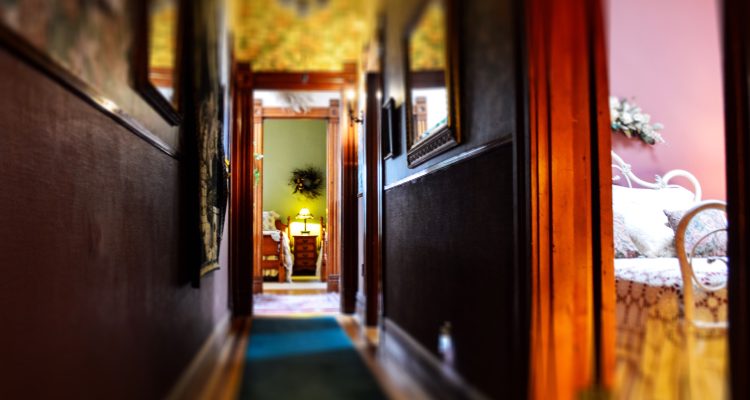He is most informed of the years important to Wheeling’s history, and she is well versed in the classic traditions such as “High Tea” as well as proper etiquette, and together this couple molds that collective perspective to make the historical Eckhart House in North Wheeling what it is today.
And that’s a healthy step back into eras that preceded every single person who has chosen to read this.
Joe and Gretchen Figaretti arrived here more than 20 years ago because they once had a conversation with a former neighbor of theirs by the name of Dick Dlesk, a most successful businessman who passed away in December 2013. One day during a casual conversation the Figarettis shared their approval of the tours taking place that concerned the city’s Victorian architecture, and Dlesk, a benefactor to West Virginia University, The Linsly School, and the Wheeling Symphony Orchestra, had a suggestion.
“He told us we should buy it from him, and the price was very reasonable because he had purchased it at a very low price because of its condition at the time,” Joe explained. “We thought about it and thought about it, and then finally we decided to purchase it.
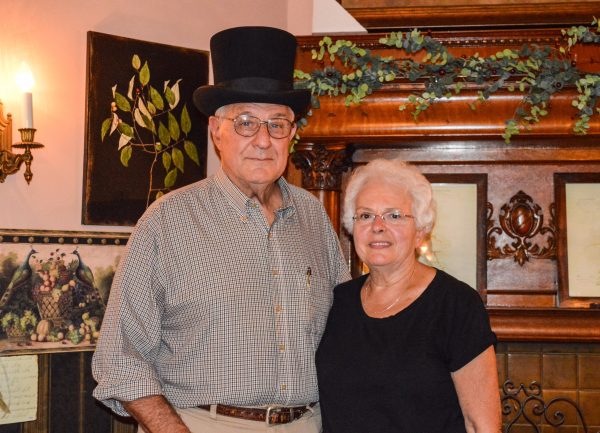
“Dick had renovated about five of the rooms. and his idea was for Gretchen to make it a kitchen design studio for her business at the time so we could take advantage of all of the people who were touring these houses,” he continued. “She had done a kitchen in one of the other houses, and it received a lot of great reviews, so we thought it was a very good idea.”
That was 1991. Their two sons, Chris of Wheeling and Atlanta resident Josh, were grown; Joe was considering the sale of computer software company, and the couple found themselves ready to depart their Stamm Lane neighborhood near Wheeling Park for a much different setting on Main Street north of the Fort Henry Bridge.
“The more we got involved with this house, the more enamored we became of it,” Joe explained. “So then we spent a year with various crews getting it back into condition. And now it’s one of the most fabulous houses I’ve ever come across.
“That’s really why we decided to move in. We left our old neighborhood and came to North Wheeling,” he continued. “At first it was a pretty rough place, but within five years the entire neighborhood turned over and changed for the better. It became a great place to live, and it’s stayed that way ever since.”
Initially, the Figarettis follow the business plan to a tee with Gretchen designing kitchens and Joe selling his company in 1993 and re-inventing his interests by adopting a supreme intrigue in the long and storied history of the Friendly City.
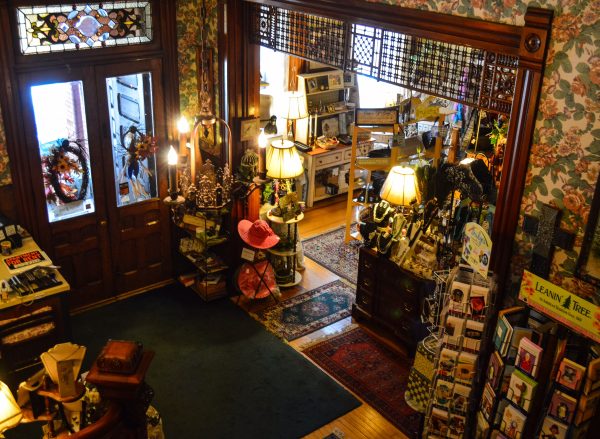
“Then we decided that we would open a gift shop here, too, to take advantage of the buses that were coming in for the Victorian tours and for all of the shows that were still taking place at the Capitol Music Hall,” Joe recalled. “During those times we would have 60 or 70 buses each year because the Jamboree was still chugging along, and the gift shop was doing very well. But then it went away.”
Live Nation, the former owners of the Capitol Theatre, closed the venue in 2006 instead of performing the necessary fire safety updates to the interior and exterior of the historic structure. Now there were no buses, no one coming into Wheeling from outside the Upper Ohio Valley, and too few visitors to the Eckhart House.
Something had to be altered, so that’s exactly what the Figarettis did.
“That’s when we decided to make some changes, and that’s when I started getting much more involved with the history of Wheeling, and now I am a fairly good public speaker and storyteller, and that’s when we had the teas, the tours and the gift shop, and the number of people began to building again,” Joe remembered. “It all became a sustainable business, and then we also bought seven more buildings around us here for rental properties.
“We were able to sustain ourselves very nicely even though our tea room only holds about 25 people,” he said. “So we have this lovely tea room, and we have the ability to welcome groups and do historical presentations that I believe are extremely entertaining. If you can take Wheeling history and put it in a way that people can get really excited about it, it is superb.”
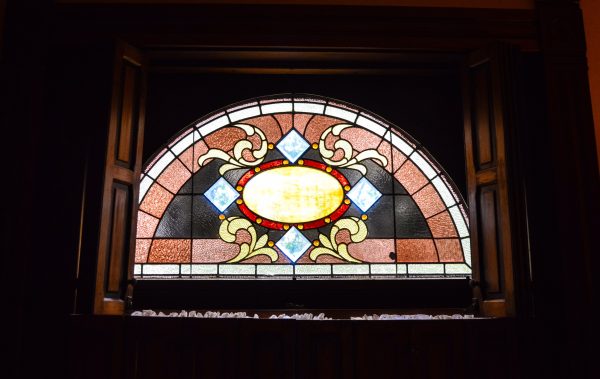
The Past and the Present
This impressive structure was finished in 1902 and came complete with 12 fireplaces on its three floors. But, as Joe loves to remind his tour takers, the original residents did not burn wood in those spaces.
Nope. Natural gas.
“Wheeling was the first city west of the Alleghenies to have running water in 1834, and then came the gas, and after that residential electricity happened here in 1882, so when this house was constructed, it had all of those amenities,” Figaretti said. “The electricity that it had at first was DC electricity, but after they discovered the restrictions of DC electricity, they switched over in 1887 to AC electricity. Each power plant could only supply 50 customers, but AC electricity was different.
“A company out of Pittsburgh by the name of Westinghouse had an employee by the name of Nicholai Tesla, and Wheeling was one of the very first cities to have AC electricity. AC electricity allowed each plant to have 650 customers, and they could be miles away from each other,” he continued. “The Eckhart House was constructed in 1902 with AC electricity in it. It wasn’t until 1893 at the Chicago Exhibition when AC electricity was accepted nationwide, and that’s what we still use today.”
And that’s only the beginning. He likes to tell the tales involving the city’s once prosperous steamboat and glass manufacturing industries, the commerce that flowed along National Road and over the Wheeling Suspension Bridge to the West.
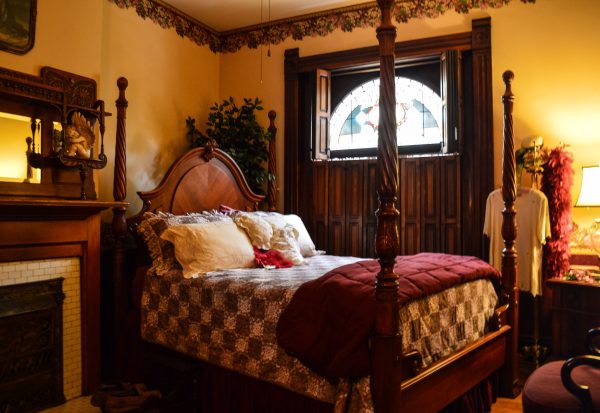
And that’s not even the end because this gentleman believes he has at least six hours of information stowed away for use during his talks.
“There’s not a place in this country that can even hold a candle to the history of this city, so that’s why I break it up into segments,” Joe explained. “We have an 18th century segment, early 19th century segments, late 19th century, early 20th century, and so forth, and make stories out of all it. The people really seem to enjoy it very much.”
His tales go beyond the facts, though, and that’s because Joe’s stories include a perspective most historians fail to offer everywhere. He reached back to the days of the Revolutionary War era for a perfect example.
“There is a true story about Betty Zane and not the one that is boring no one wants to hear,” Joe insisted. “How important was she? What did she do? What impact did she have on American history? What people learn is that a Wheeling girl changed history.
“What I tell them is that Fort Henry was a falling down dump because the wood was rotting, and there were only 25 men in there to defend it against 400 Shawnee Indian braves and British rangers. They didn’t have a chance, but this little girl, at the age of 16, so humiliated the Indians by running in front of them, and they couldn’t catch her,” he continued. “They finally quit. They walked away from the battle. Had they stayed and continued onto Fort Pitt, they would have found out that it was undefended. That would have meant America would have been defeated, but one 16-year-old girl changed all of that.”
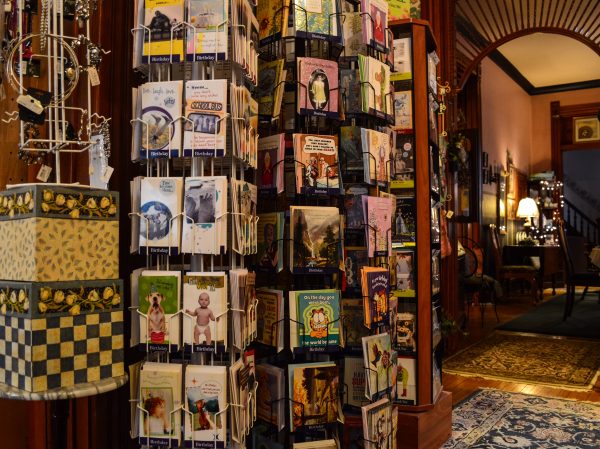
For those intrigued but fearful of the impending colder temperatures in this area, they need not worry. Joe offers his lessons without leaving the Eckhart House at all, a place filled with unique teas and tea accessories, greeting cards, jewelry, scarves and clothing, and, at times, furniture.
The Eckhart House is open from 10 a.m.-5 p.m. Monday through Saturday, and Saturdays are the busiest at the North Wheeling location. A “high Tea” luncheon begins at 12:30 p.m.; Joe starts his tour at 2 p.m., and then the Figarettis host an afternoon tea at 3 p.m. The Eckhart House also is available for rentals and small birthday parties, wedding or baby showers, and family groups with six or more.
“I offer a historical perspective of Wheeling and explain the importance of Wheeling,” Joe said. “And then I take them through this house so that they can envision how important a place this once was. I tell them that this is the largest and most important repository of Victorian architecture in the United States. There’s no other place like it.
“That’s why we own this house. We went to Savanah, Ga., and we went to Charleston, S.C., and we said after those trips that Wheeling has more than those places. That’s why we came back and bought these houses, and that’s the story that I tell them,” he continued. “We show them how people lived in the 1890s, and we tell them about what Wheeling had to offer through the many years it’s been here. And the tour is also interactive, and I can give one tour one hour and a completely different tour the next hour.”
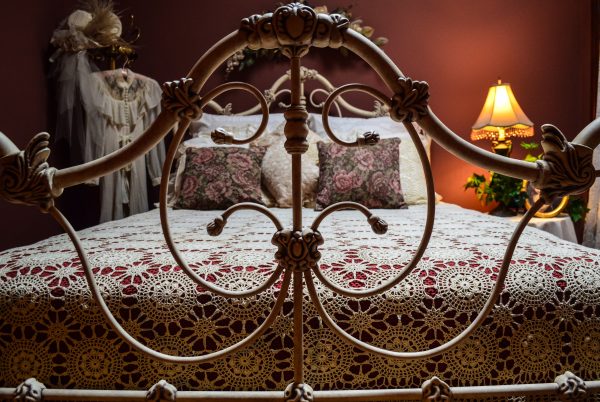
The Future
Ask them what they believe the future of Wheeling is, and these two lifelong residents greatly differ with their opinions. One, in fact, gives this city only 10 more years of survival if something he deems most important does not take place, but the other thinks a resurrection is always under way.
Joe is the dreamer, a man who once thought constructing a replica of Fort Henry on riverfront land where the trains once rolled would attract more tourists to North Wheeling, and Gretchen has the duty of tempering her husband’s positivity and negativity. But once he arrives at the topic concerning the future of this city and area, Joe refers to a ticking clock.
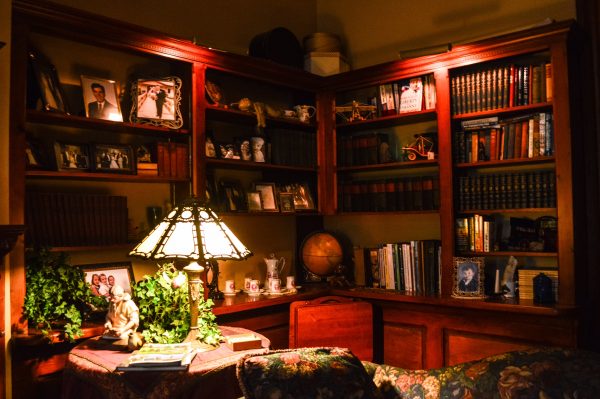
“We’ve come to the conclusion that this is fun because the history of Wheeling is so under-told, so misunderstood, and uninteresting to the people who live here that I’m the only voice in the wilderness proclaiming it,” he said. “But I believe it must be told as often as possible.
“I usually speak to the future of Wheeling this way; I do not believe Wheeling can prosper until the people of Wheeling take the city seriously again as an important place unless they understand it’s history,” Joe continued. “If they are not interested in the history, then they can’t be interested in its future. I have tried to invite Wheeling’s leaders here, and, for the past 25 years, I don’t remember a single one walking through that front door.”
Twenty-five years include a lot of current and former council members and mayors, but perhaps that will change because of his wife’s view on what Wheeling looks like today and what it may offer when the commercial and residential development are completed.
“I’m excited for the future of Wheeling because I think there is a lot of enthusiasm about it right now, and I am also excited about the new administration,” Gretchen said. “And I think there is hope in the downtown, and the Health Plan building is going to make a big difference. I believe it will open some doors for some retail and other businesses in the downtown.
“I believe Heritage Port is fabulous, and it’s a very busy place when the weather cooperates,” she said. “I feel good about the future of Wheeling, and Joe is, too, but our history is very important to this area, and we both hope the level of interest in that history increases because it should already be pretty high, and I don’t know if that’s true just yet.”
(Photos by Steve Novotney)


